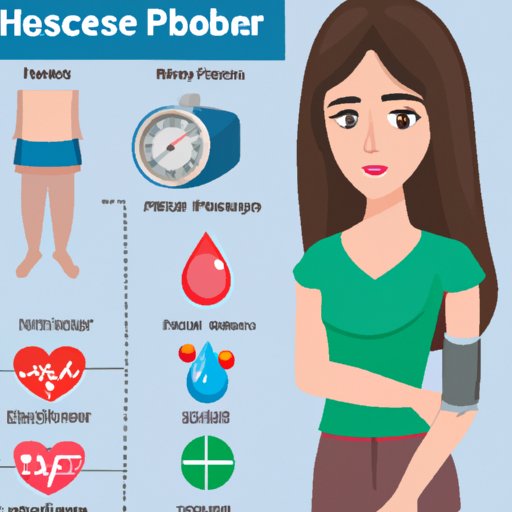
Introduction
High blood pressure, also known as hypertension, is a common condition that affects millions of people worldwide. It is often referred to as the “silent killer” as it can go undetected for years, causing damage to the body without any visible symptoms. It is important to recognize the symptoms of high blood pressure, especially in women, as this condition can lead to serious health problems if left untreated.
The Silent Killer: Uncovering the Symptoms of High Blood Pressure in Women
High blood pressure earned its nickname because it often displays no visible symptoms. This means that many people may have high blood pressure without even knowing it. However, several physical symptoms can indicate high blood pressure, even if they are not always obvious.
High blood pressure symptoms can vary from person to person, but there are some common symptoms to look out for. However, these symptoms are not always present, which is why regular screening is so important.
Don’t Ignore These Warning Signs: Top Symptoms of High Blood Pressure in Women
Although there may be no visible symptoms, there are some warning signs of high blood pressure in women that shouldn’t be ignored. These symptoms include:
- Headaches
- Nosebleeds
- Chest pain
If you experience these symptoms, it is essential to consult your doctor. These symptoms may not always indicate high blood pressure, but it is important to rule it out as a potential cause.
Women & Hypertension: Understanding the Most Common Symptoms
High blood pressure affects women more frequently than men. This is because women experience unique physiological changes such as pregnancy, menopause, and hormonal fluctuations that can lead to high blood pressure. Furthermore, women are more likely to develop high blood pressure at a younger age compared to men.
Dietary changes can reduce the risk of high blood pressure in women. Women are often advised to reduce their sodium intake, consume foods rich in potassium, and maintain a healthy weight. Regular physical activity and stress reduction measures can also help to lower the risk of hypertension in women.
Beyond the Headache: Exploring Lesser-Known Symptoms of High Blood Pressure in Women
There are several other symptoms of high blood pressure that are lesser-known but are still essential to look out for. These include:
- Vision changes
- Shortness of breath
- Fatigue
These symptoms can be mild and easily overlooked, but it is important to take them seriously. If you experience any of these symptoms, consult your doctor immediately. Medical tests may be required to detect less overt symptoms of high blood pressure.
How High is Too High? Symptoms Women Should Look Out for in Relation to Blood Pressure
The American Heart Association (AHA) defines high blood pressure as a reading of 130/80 mmHg or higher. However, blood pressure levels can vary based on age, gender, and individual health histories. Women with blood pressure levels of 120/80 mmHg or higher should monitor their blood pressure regularly, especially if they have other risk factors, such as a family history of hypertension or smoking.
Ongoing monitoring by a healthcare professional is important for women with high blood pressure. Maintaining a healthy lifestyle and following prescribed medical treatments are crucial in controlling hypertension.
Conclusion
In conclusion, high blood pressure is a serious condition that can lead to significant health risks. Women are especially at risk as they experience unique physiological changes. Symptoms of high blood pressure can vary, but it is crucial to pay attention to the warning signs. Early detection and treatment can help prevent long-term health consequences. Regular screening and lifestyle modifications can reduce the risk of hypertension and other health problems linked to high blood pressure. Women should always prioritize their health and seek medical attention if they experience any symptoms of high blood pressure.





